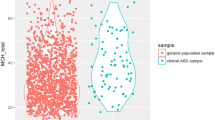Abstract
Objective
The purpose of this study was to translate the Pediatric assessment scale for severe feeding Problems (PASSFP) into Turkish and investigate its validity and reliability.
Methods
The study included Turkish translation of the PASSFP, and investigating its reliability and criterion validity in relation with Children’s eating behavior questionnaire (CEBQ).
Results
Cronbach Alpha reliability of T-PASSFP was 0.79, and of its subscales, i.e. Form A and B, were 0.67, and 0.73, respectively. Test-retest correlation was 0.99 for the scale and Form A, and 0.94 for Form B. There were positive correlations between total scale and Enjoyment of food and Food fussiness subscales of CEBQ. Form A had positive relationships with Food responsiveness, Enjoyment of food, and Food fussiness subscales. Form B had positive correlations with Enjoyment of food and negative correlations with Slowness in eating subscales.
Conclusion
The Turkish PASSFP is valid and reliable in evaluating feeding in children with neurodevelopmental disorders. Form A is applied for all children, and Form B is used for partially or totally oral-fed children
Similar content being viewed by others
References
Dahlseng MO, Finbråten A-K, Júlíusson PB, Skranes J, Andersen G, Vik T. Feeding problems, growth and nutritional status in children with cerebral palsy. Acta Paediatr. 2012;101:92–8.
Mergler S, Evenhuis HM, Boot AM, et al. Epidemiology of low bone mineral density and fractures in children with severe cerebral palsy: A systematic review. Dev Med Child Neurol. 2009;51:773–8.
Crist W, Dobbelsteyn C, Brousseau AM, Napier-Phillips A. Pediatric assessment scale for severe feeding problems: Validity and reliability of a new scale for tube-fed children. Nutr Clin Pract. 2004;19:403–8.
Field D, Garland M, Williams K. Correlates of specific childhood feeding problems. Paed Child Healt-Can. 2003;39:299–304.
Goday PS, Huh SY, Silverman A, et al. Pediatric Feeding Disorder: Consensus Definition and Conceptual Framework. J Pediatr Gastr Nutr. 2019;68:124–9.
Burd RS, Price MR, Whalen TV. The role of protective antireflux procedures in neurologically impaired children: A decision analysis. J Pediatr Surg. 2002;37:500–6.
Calis EAC, Veugelers R, Sheppard JJ, Tibboel D, Evenhuis HM, Penning C. Dysphagia in children with severe generalized cerebral palsy and intellectual disability. Dev Med Child Neurol. 2008;50:625–30.
Novotny NM, Jester AL, Ladd AP. Preoperative prediction of need for fundoplication before gastrostomy tube placement in children. J Pediatr Surg. 2009;44:173–7.
Ponsky TA, Gasior AC, Parry J, et al. Need for subsequent fundoplication after gastrostomy based on patient characteristics. J Surg Res. 2013;179:1–4.
Jaafar NH, Zabidi-hussin Z, Othman A, Majid NA, Harith S. Parent-report instruments for assessing feeding difficulties in children with neurological impairments: a systematic review. Dev Med Child Neurol. 2018;61:135–44.
Charpentier A, Morgan S, Harding C. A service evaluation of parent adherence with dysphagia management therapy guidelines: reports from family carers supporting children with complex needs in Greece. Disabil Rehabil. 2020;42: 426–33.
Arvedson JC. Assessment of pediatric dysphagia and feeding disorders: Clinical and instrumental approaches. Dev Disabil Res Rev. 2008;18:118–27.
Wardle J, Guthrie CA, Sanderson S, Rapoport L. Development of the Children’s Eating Behaviour Questionnaire. J Child Psychol Psychiatry. 2001;42:963–70.
Yilmaz R, Esmeray H, Erkorkmaz Ü. Adaptation study of the Turkish children’s eating behavior questionnaire [Article in Turkish]. Anadolu Psikiyatri Derg. 2011;12:287–94.
Sanchez K, Spittle AJ, Allinson L, Morgan A. Parent questionnaires measuring feeding disorders in preschool children/: a systematic review. Dev Med Child Neurol. 2015;57:798–807.
Speyer R, Cordier R, Parsons L, Denman D, Kim J-H. Psychometric characteristics of non-instrumental swallowing and feeding assessments in pediatrics: A systematic review using COSMIN. Dysphagia. 2018;33:1–14.
Sheppard JJ, Hochman R, Baer C. The dysphagia disorder survey: validation of an assessment for swallowing and feeding function in developmental disability. Dev Disabil Res Rev. 2014;35:929–42.
Author information
Authors and Affiliations
Corresponding author
Additional information
Ethics clearance
Non-Invasive Clinical Research Ethics Committee of Hacettepe University; No. GO 13/433.
Contributors
MY: planning the study, collecting data and writing the manuscript; TA: statistical analysis and contribution to writing discussion section; SSA: contributing to data collection to data and writing discussion section; AAK: contributing to planning the study and interpretation the results.
Funding
None
Competing interests
None stated.
Rights and permissions
About this article
Cite this article
Yazici-Gulay, M., Aktan, T., Serel-Arslan, S. et al. Validity and Reliability of the Turkish Version of the Pediatric Assessment Scale for Severe Feeding Problems. Indian Pediatr 58, 241–245 (2021). https://doi.org/10.1007/s13312-021-2163-0
Received:
Revised:
Accepted:
Published:
Issue Date:
DOI: https://doi.org/10.1007/s13312-021-2163-0




